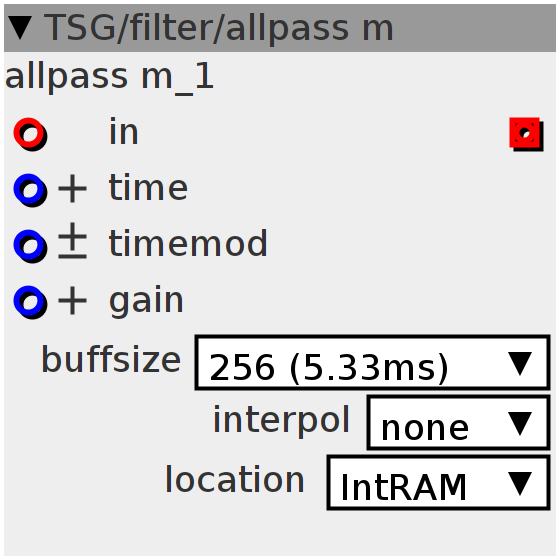allpass m
A modulatable 32bit schroeder allpass filter with different types of interpolation (for reverbs and diffusers)
Inlets
frac32buffer in
frac32.positive time
frac32.positive gain
frac32.bipolar timemod
Outlets
frac32buffer out
Attributes
combo buffsize
combo interpol
combo location
#if attr_location == 0
#define LOCATION
#else
#define LOCATION __attribute__((section(".sdram")))
#endif
static const uint32_t LENGTHPOW = (attr_buffsize);
static const uint32_t LENGTH = (1 << attr_buffsize);
static const uint32_t LENGTHMASK = ((1 << attr_buffsize) - 1);
int32_t *delayline;
int wptr;static int32_t array_[attr_poly][LENGTH] LOCATION;
delayline = &array_[parent->polyIndex][0];
for (int i = 0; i < LENGTH; i++)
delayline[i] = 0;
wptr = 0;int32_t g2 = inlet_gain << 3;
int32_t time = ___SMMUL(inlet_time, inlet_timemod) + inlet_time;
int32_t readOffset_ls8 = ___SMMUL(LENGTH << 10, time << 3);
if (readOffset_ls8 < (8 << 8))
readOffset_ls8 = (8 << 8); // never less delay than 8 samples
#if attr_interpol > 0
int32_t rint = readOffset_ls8 >> 8; // integral part of delay time
int32_t rfrac =
readOffset_ls8 & 0x000000FF; // fractional part of delay time in Q8 notation
#endif
// pre-calculate coefficients for 3pt interpolation
#if attr_interpol == 2
// basic formula: y = ax^2 + bx + c
// a = 1/2*y3 - y2 + 1/2*y1
// b = -1/2*y3 + 2*y2 - 3/1*y1
// c = y1
// optimized formula (with c1..c3 = const for each block of samples):
// y = y1*c1 + y2*c2 + y3*c3
// c1 = 1 + 1/2*x^2 - 3/2*x
// c2 = -x^2 + 2x
// c3 = 1/2*x^2 - 1/2*x
int32_t x2 = (rfrac * rfrac); // x^2 in Q16 notation
// in Q16 notation
int32_t c1 = (1 << 16) + (x2 >> 1) - (rfrac << 7) - (rfrac << 8);
int32_t c2 = -x2 + (rfrac << 9);
int32_t c3 = (x2 >> 1) - (rfrac << 7);
#endif// no interpolation
#if attr_interpol == 0
int32_t rptr = wptr - (readOffset_ls8 >> 8);
int32_t dout = delayline[rptr & LENGTHMASK];
// linear (2pt) interpolation
#elif attr_interpol == 1
int32_t rptr1 = wptr - rint;
int32_t rptr2 = rptr1 + 1;
int32_t dout1 = delayline[rptr2 & LENGTHMASK] >> 1;
int32_t dout2 = delayline[rptr1 & LENGTHMASK] >> 1;
int32_t dout = ___SMMLA(rfrac << 23, (dout2 - dout1) << 1, dout1) << 1;
// qubic (3pt) interpolation
#elif attr_interpol == 2
int32_t rptr1 = wptr - rint;
int32_t rptr2 = rptr1 + 1;
int32_t rptr3 = rptr1 + 2;
int32_t dout1 = delayline[rptr3 & LENGTHMASK];
int32_t dout2 = delayline[rptr2 & LENGTHMASK];
int32_t dout3 = delayline[rptr1 & LENGTHMASK];
int32_t douttmp1 = ___SMMUL(dout1, c1 << 14);
int32_t douttmp2 = ___SMMLA(dout2, c2 << 14, douttmp1);
int32_t dout = ___SMMLA(dout3, c3 << 14, douttmp2) << 2;
#endif
int32_t din = ___SMMLA(g2, dout, inlet_in >> 2) << 1;
delayline[wptr] = din;
outlet_out = ___SMMLS(g2, din, dout >> 1) << 2;
wptr = (wptr + 1) & LENGTHMASK;